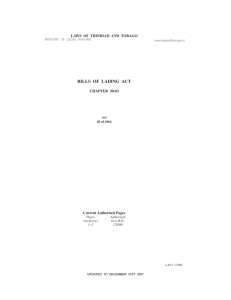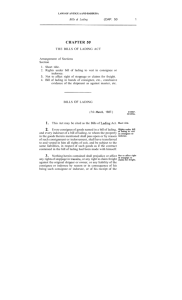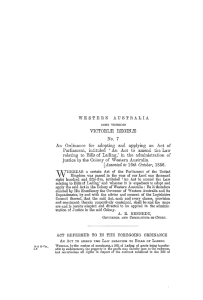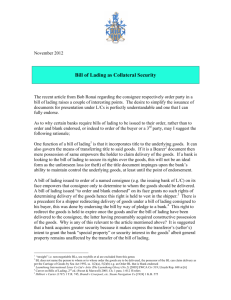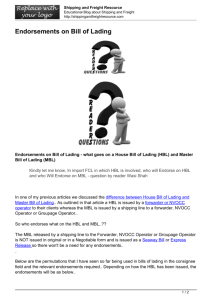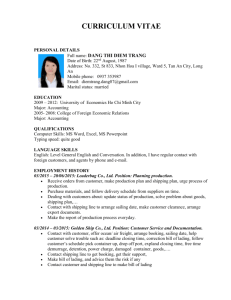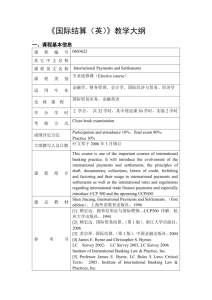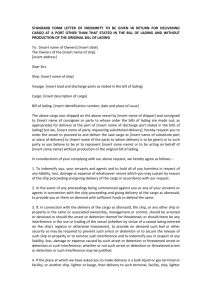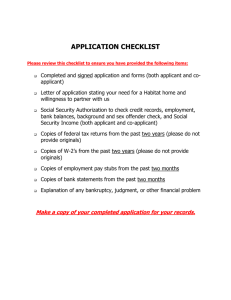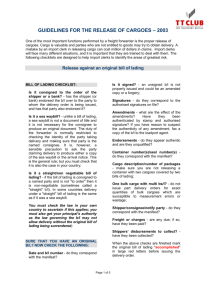Original Bills of Lading - Treat Them Like Gold!
advertisement
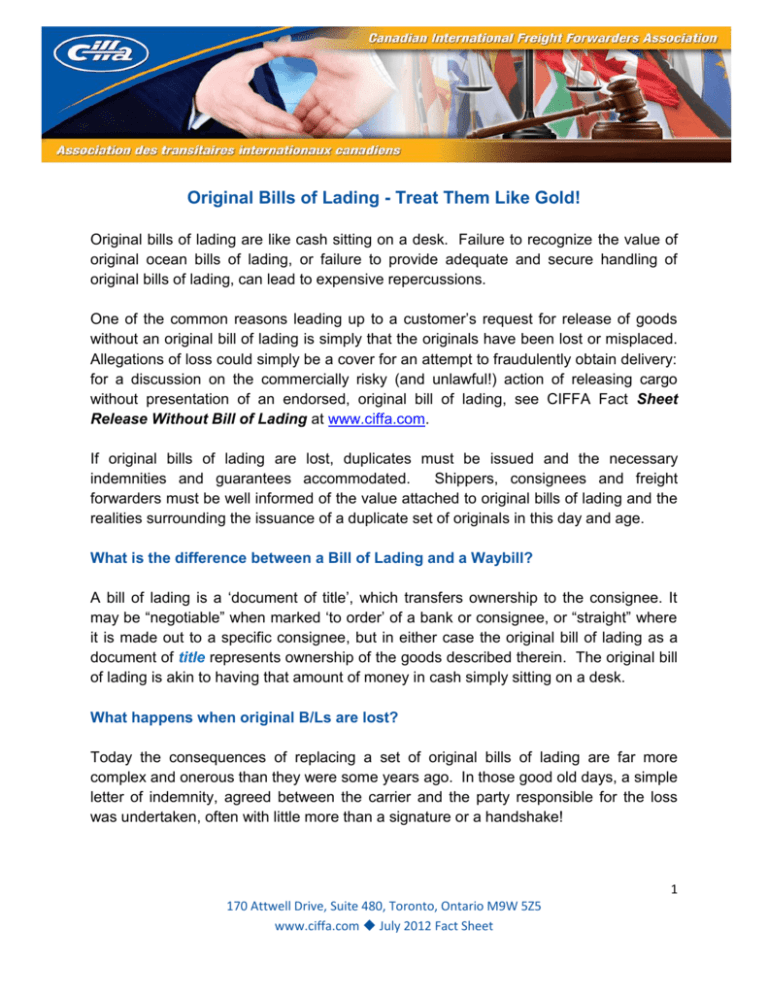
Original Bills of Lading - Treat Them Like Gold! Original bills of lading are like cash sitting on a desk. Failure to recognize the value of original ocean bills of lading, or failure to provide adequate and secure handling of original bills of lading, can lead to expensive repercussions. One of the common reasons leading up to a customer’s request for release of goods without an original bill of lading is simply that the originals have been lost or misplaced. Allegations of loss could simply be a cover for an attempt to fraudulently obtain delivery: for a discussion on the commercially risky (and unlawful!) action of releasing cargo without presentation of an endorsed, original bill of lading, see CIFFA Fact Sheet Release Without Bill of Lading at www.ciffa.com. If original bills of lading are lost, duplicates must be issued and the necessary indemnities and guarantees accommodated. Shippers, consignees and freight forwarders must be well informed of the value attached to original bills of lading and the realities surrounding the issuance of a duplicate set of originals in this day and age. What is the difference between a Bill of Lading and a Waybill? A bill of lading is a ‘document of title’, which transfers ownership to the consignee. It may be “negotiable” when marked ‘to order’ of a bank or consignee, or “straight” where it is made out to a specific consignee, but in either case the original bill of lading as a document of title represents ownership of the goods described therein. The original bill of lading is akin to having that amount of money in cash simply sitting on a desk. What happens when original B/Ls are lost? Today the consequences of replacing a set of original bills of lading are far more complex and onerous than they were some years ago. In those good old days, a simple letter of indemnity, agreed between the carrier and the party responsible for the loss was undertaken, often with little more than a signature or a handshake! 1 170 Attwell Drive, Suite 480, Toronto, Ontario M9W 5Z5 www.ciffa.com July 2012 Fact Sheet Today, carriers (Master or NVOCC) require a letter of indemnity, counter-signed by a bank representing a guarantee for as much as two to two and a half times the value of the cargo. And the guarantee can be required to be valid for as long as 30 months. Let’s put this into perspective. If there are 10 X 40’ containers, each containing $100,000.00 worth of cargo on one bill of lading that could represent the need for a bank guarantee of as much as 2.5 MILLION dollars! In order to obtain that guarantee, the responsible party (shipper/consignee/agent/bank, in fact whoever lost the originals) must post surety that satisfies the bank or bonding company. The affect on assets and cash flow can be considerable. So what is the potential of a “commercial gesture” on the part of the carrier to mitigate such an incident? (Release without the indemnity/ guarantee or the original) Releasing cargo without surrender of the properly endorsed original bill of lading would expose the carrier or NVOCC to a huge risk. Insurers would most certainly balk at such a suggestion. As we discuss in the Release Without Original Bill of Lading Fact Sheet, the act of releasing cargo without surrender of the originals would be viewed as fraudulent in most cases. No professional carrier, NVOCC or freight forwarder should agree to such an approach without security. The bottom line is that original bills of lading should be treated as one would any negotiable instrument representing something of value: A bag of gold or cash, sitting on the desk. What should I do when a customer has lost the originals? Obtain the shipper’s confirmation of the error resulting in the loss of the original documents, and that the consignee has paid for the goods and is entitled to delivery. Obtain from the consignee (importer) a bank guarantee for at least the CIF value of the goods. If you are the carrier or the NVOCC whose originals have been lost, the indemnity amount you require from the consignee may be much higher than the CIF Value of the goods, as consideration for legal disputes and costs must be recognised. (see note: up to 2 ½ times the value of the goods, valid for many months.) Obtain the consignee’s guarantee and indemnity for all claims and charges. Ensure the decision is made by senior staff with authority to accept such liability. 2 170 Attwell Drive, Suite 480, Toronto, Ontario M9W 5Z5 www.ciffa.com July 2012 Fact Sheet How could I do to avoid such problems in the first place? For export cargo: o Secure original bills of lading in whatever ways are practical. o Ensure that employees and others entrusted with their handling are fully trained in the handling of bills of lading and are aware of the consequences if originals are lost. o Don’t send a full set of originals to an agent. Hold one original in the event the others go astray. For import cargo: o Ensure that employees are trained and understand what it means when a house or any other bill of lading is marked ‘copy’ or is consigned “To Order”, or to a bank. o Confirm with customers well in advance of delivery that they are obligated to present properly endorsed original bills of lading. o Confirm with customs brokers that goods will not be released without presentation of endorsed originals. o Do not issue pick-up instructions or confirmation numbers until presentation of originals. DISCLAIMER: CIFFA is not a law firm and does not have any lawyer or any other person qualified to give legal advice on staff. CIFFA offers its Members general guidance and assistance based on the collected experience of its Members and staff, and does so gratuitously and without liability for loss or damage of any kind for the use or misuse of this information, even if the loss or damage is caused or contributed to by CIFFA’s own negligence or the negligence of its employees. CIFFA CANNOT AND DOES NOT OFFER LEGAL ADVICE. Only a lawyer qualified and licensed to practice in your jurisdiction and properly retained can provide legal advice. If you are of the opinion that you may have a legal problem, you should seek the advice of a qualified professional. 3 170 Attwell Drive, Suite 480, Toronto, Ontario M9W 5Z5 www.ciffa.com July 2012 Fact Sheet
